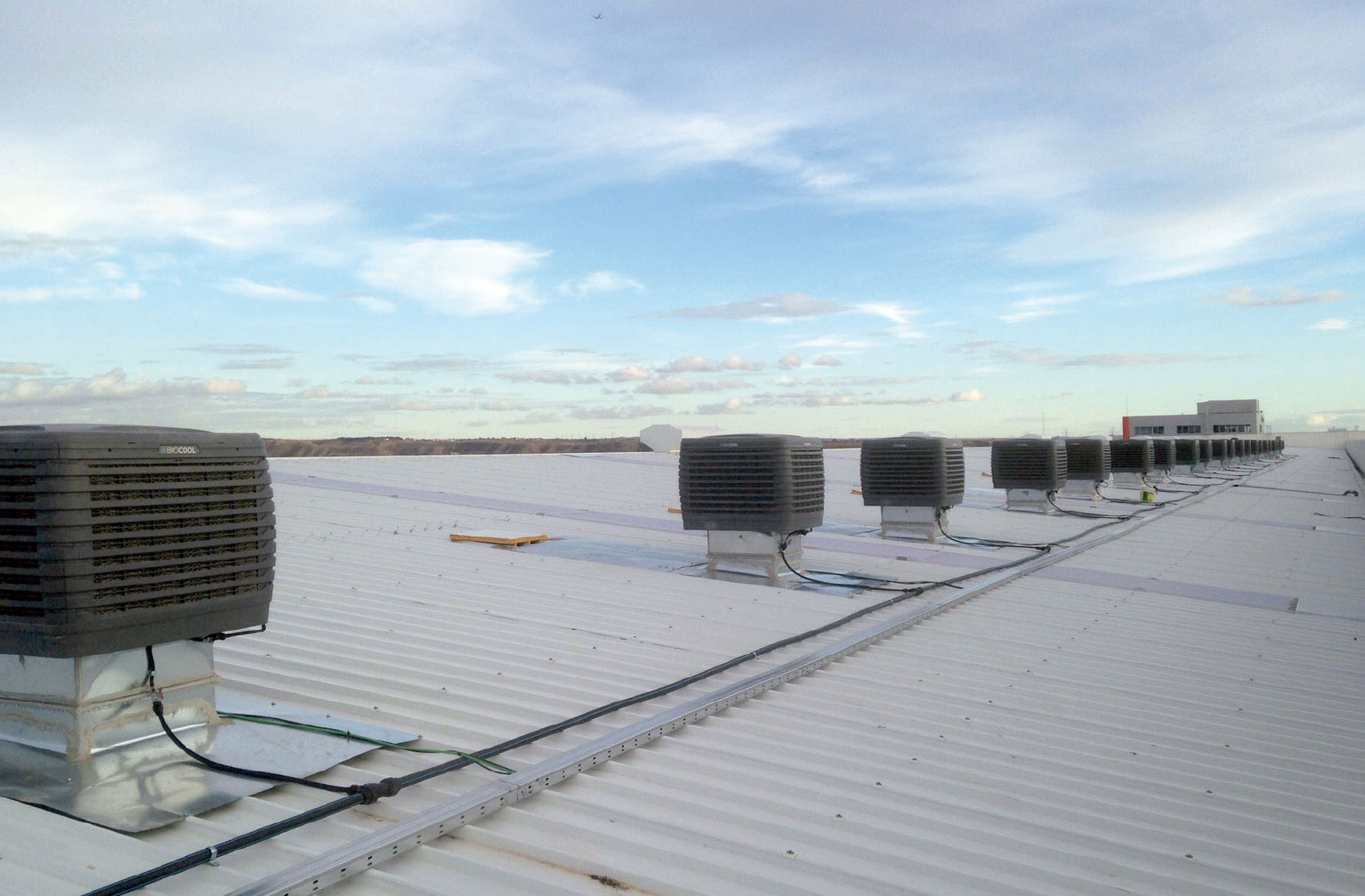Air conditioning of industrial buildings with evaporative air conditioners
THE PROBLEM
HEAT IN INDUSTRIAL BUILDERS AND WORK ENVIRONMENTS WITH VENTILATION NEEDS

- HEAT ACCUMULATION
- MYSTERIES
- LOW PRODUCTIVITY
- ODORS AND DUST
THE SOLUTION
CLIMATIZATION OF INDUSTRIAL VESSELS THROUGH EVAPORATIVE CLIMATIZATION

- MINIMUM CONSUMPTION
- ALLOW OPEN ACCESS
- DO NOT RECIRCULATE THE AIR
- TEMPERATURE AND PARAMETERABLE HUMIDITY
MEET THE CLIMATE CONTROL OF INDUSTRIAL VESSELS WITH BIOCOOL EVAPORATIVE COOLERS
The productivity of workers in their workplace is one of the most important elements in a company’s day-to-day operation. And temperature plays a big role in this aspect. Poor performance due to inefficient cooling of industrial plants can have an impact on the business’s profitability, which can be disastrous.
For this reason, decisions on installing HVAC in industrial plants should be taken very seriously. Optimum industrial ventilation is essential to obtain the highest performance from employees, so having optimum industrial cooling is essential.
Biocool evaporative systems for industrial plants are the perfect solution for cooling a plant. Our products are a benchmark in industrial cooling. This has made us leaders in the HVAC sector compared to the competition. Businesspeople who are already using a Biocool industrial evaporative cooling system know what we are talking about.
Furthermore, Biocool industrial evaporative cooling is outstanding for its great effectiveness, energy savings and respect for the environment. Installing HVAC in an industrial warehouse is no longer a problem. We have a wide range of industrial evaporative coolers and industrial air conditioning.

Cooling industrial plants using evaporative coolers achieves:
- Extraction of fumes, dust, unpleasant odours and polluting agents outdoors.
- Elimination of the problem of heat stress.
- Increase in working productivity as well as the reduction or elimination of absenteeism and occupational accidents.
- Can keep doors and windows open without a loss of cooling effectiveness.
- Provides a suitable degree of humidity, beneficial for employees and for specific industrial processes.
- Compliance with current legislation.
The energy efficiency of evaporative cooling is especially demonstrated when cooling large interior spaces such as industrial plants. Energy use by this system is minimal, which means great economic savings, while its installation is very easy.
As well as this, evaporative cooling enables “zone-specific cooling”. It is common to work solely in one specific part of the industrial plant, so it is unnecessary to cool the entire space. It is calculated that 20% of the zone used can signify up to 80% of the cost of traditional cooling. This is a huge waste, bearing in mind that HVAC of large spaces requires high investment and steep electrical costs for operation. Thanks to eco-cooling, it is possible to focus on the zone to be cooled without any loss of effectiveness nor energy, since fresh air can be carried just to where it is needed, saving a large part of the cost.
Cooling of industrial plants improves productivity and reduces employee absenteeism caused by heat stress. Given these large dimensions, it is not viable to cool industrial plants using air conditioning, both due to its high economic cost and its excessive energy use.
So in this context, an economical solution is required for cooling industrial plants, one with sustainable energy use, which enables industrial plants to be cooled intelligently, improving working conditions, increasing productivity and reducing and eliminating accidents.
It also solves the problem of dust accumulation, unpleasant odours and fumes generated by various production processes, since the air is renewed constantly and expelled outdoors. It generates filtered, clean fresh air inside the plant, while keeping all entrances open.
Sectors where air conditioning is important:
- FEEDING
- PHARMACEUTICAL WAREHOUSES
- CERAMICS
- DATA CENTERS
- FOUNDRY
- WOOD
- PAPER AND CARTON
- PAINTING
- PLASTIC
- VOLATILE PRODUCTS
- CHEMISTRY
- TEXTILE

